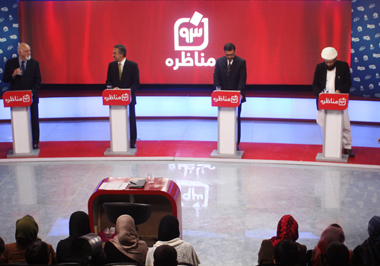Afghanistan will hold presidential and provincial council elections tomorrow. The elections represent a pivotal moment in the history of Afghanistan, which will conduct its first democratic transition of presidential power once the vote is complete.
There has been growing excitement in Afghanistan leading up to the elections. The Afghan Independent Election Commission (IEC) reported a surge in voter registration – some 3.8 million new voters were registered since May 2013 – and for the first time, presidential candidates engaged in televised debates, making public their positions on economic redevelopment, security, and women’s rights. Candidates have also held public rallies, attracting thousands of people, including many young people, throughout Afghanistan.
Women are central participants in this election. IEC Commissioner Laila Ehrari commented that the Commission’s “expectation for Afghan women, who constitute a hardworking segment of Afghan society, is that they will have broad participation in the elections and cast their votes.”Women have appeared at several campaign events, and are also running as candidates. Hundreds of women are running for seats in the provincial council, and one woman, Habiba Sarobi, the former governor of Bamian province, is running for vice president. Sarobi appears on Zalmay Rassoul’s ticket and has been actively campaigning with Rassoul in Afghanistan. At a campaign rally in Mazar-e-Sharif last week, thousands of Afghans – both men and women – cheered enthusiastically for Sarobi, and according to a campaign aide, “She pretty much rocked the show.” The other top candidates, identified as Abdullah Abdullah and Ashraf Ghani, have both addressed the role of women in Afghanistan and women’s rights, and Ashraf Ghani’s wife, Rula, a Lebanese-American Christian, has campaigned for her husband.
Taliban insurgents have launched recent assaults on journalists, election officials, and candidates in an effort to disrupt the elections – the IEC itself was the target of a Taliban attack last month-but the elections will continue on. The IEC announced yesterday that all voting centers in the country had been supplied with ballots and the necessary equipment to conduct the polls, and domestic and international observers are on hand to provide support. Voting is scheduled to take place in Afghanistan on Saturday from 7:00am to 4:00pm, but the IEC has announced that polls will remain open to accommodate overcrowding if necessary.












